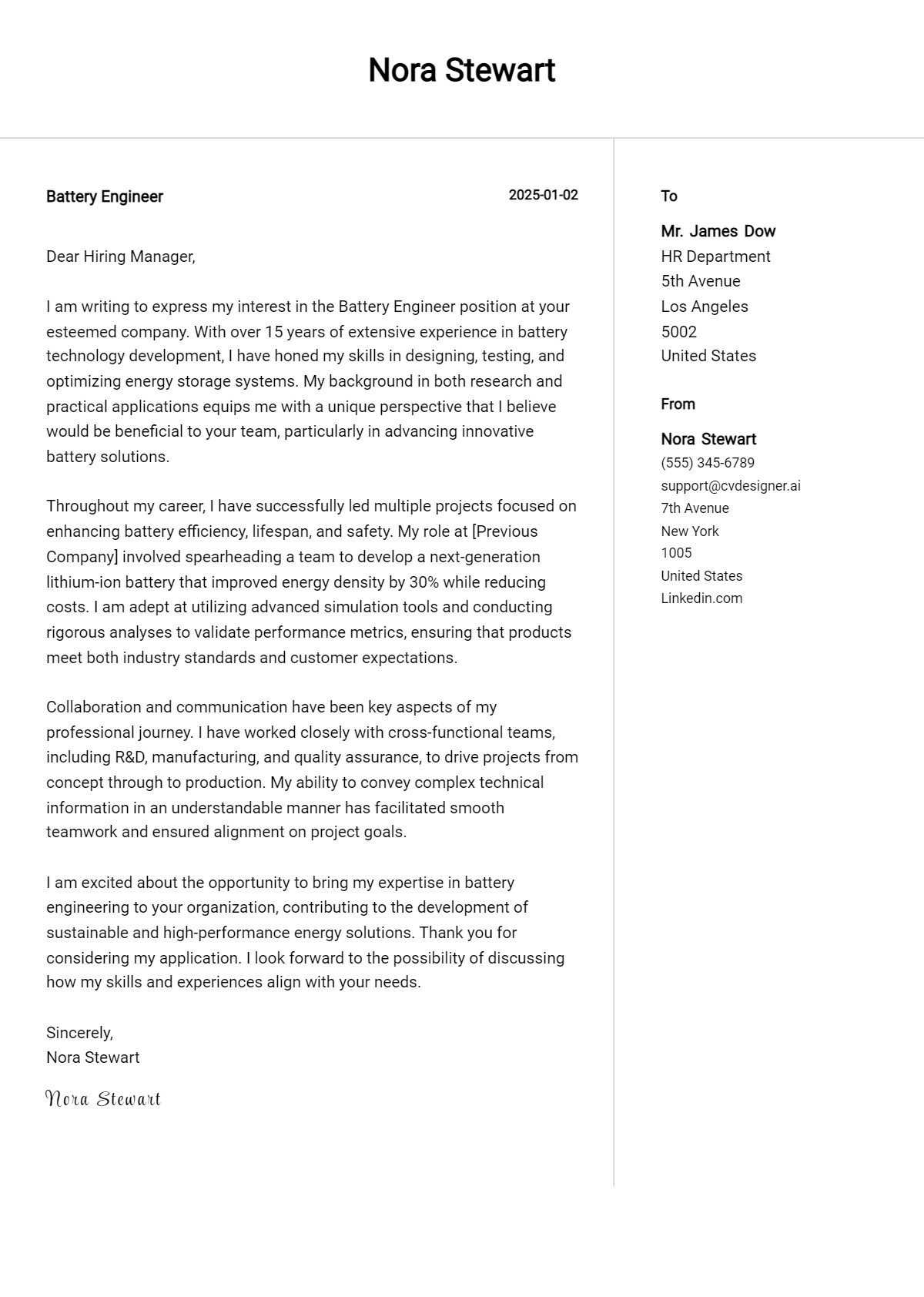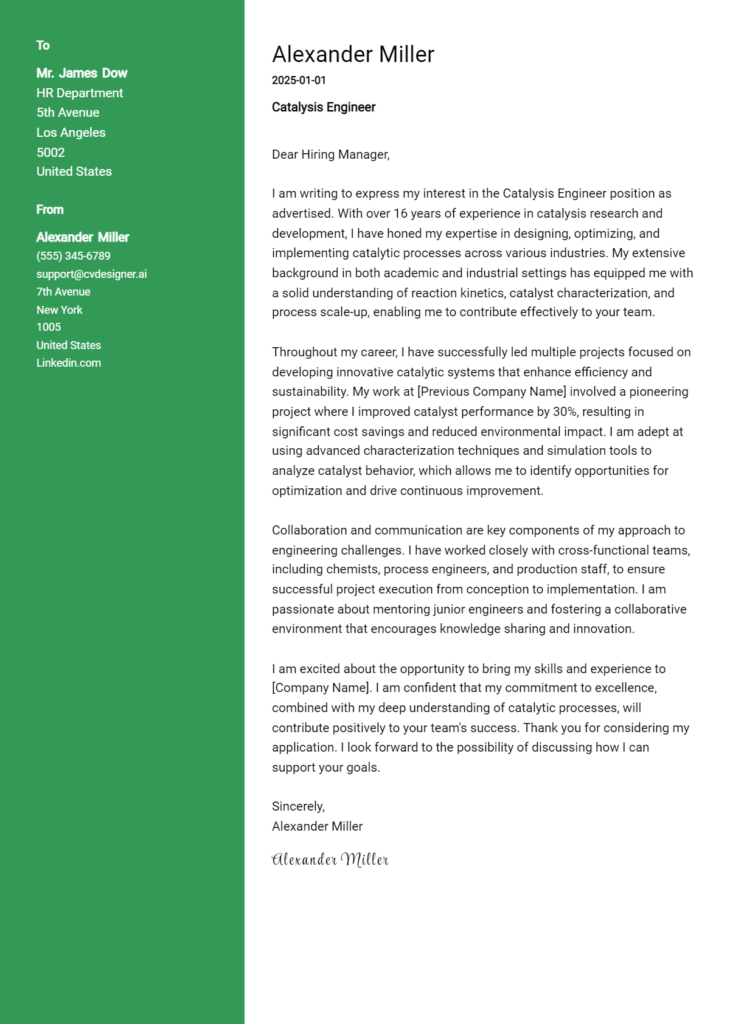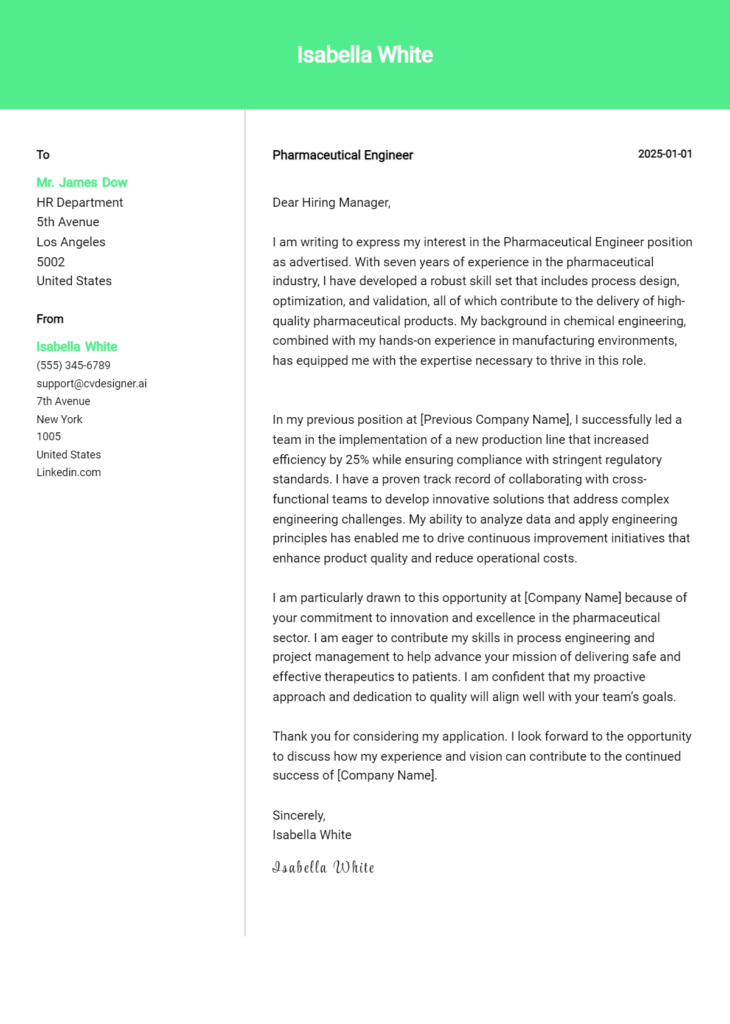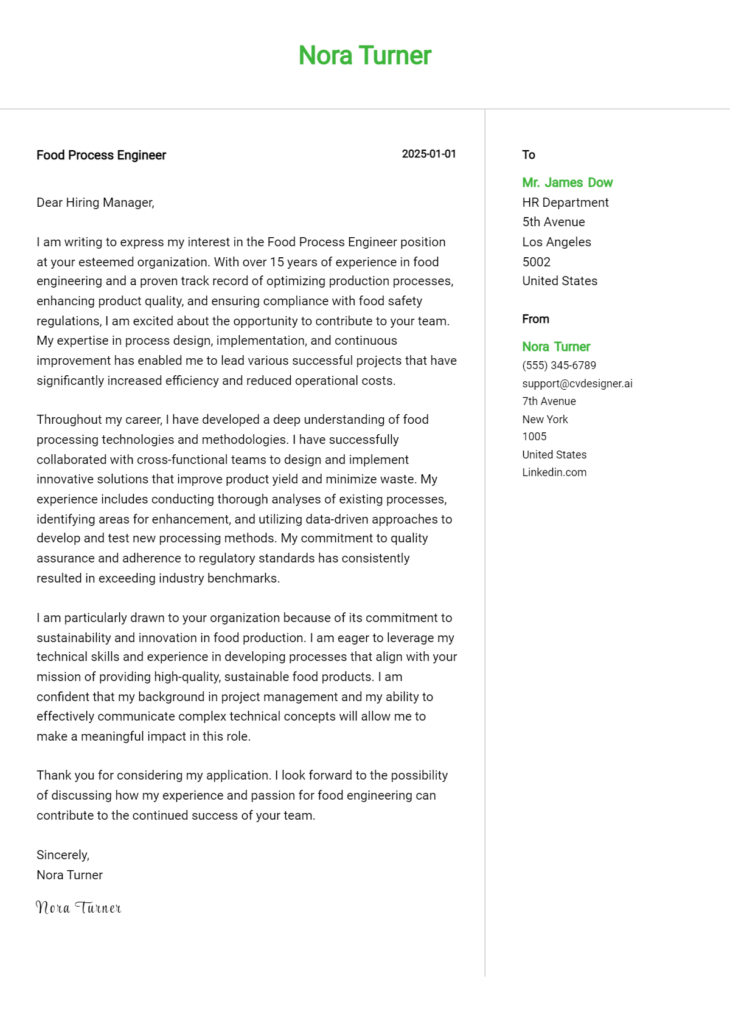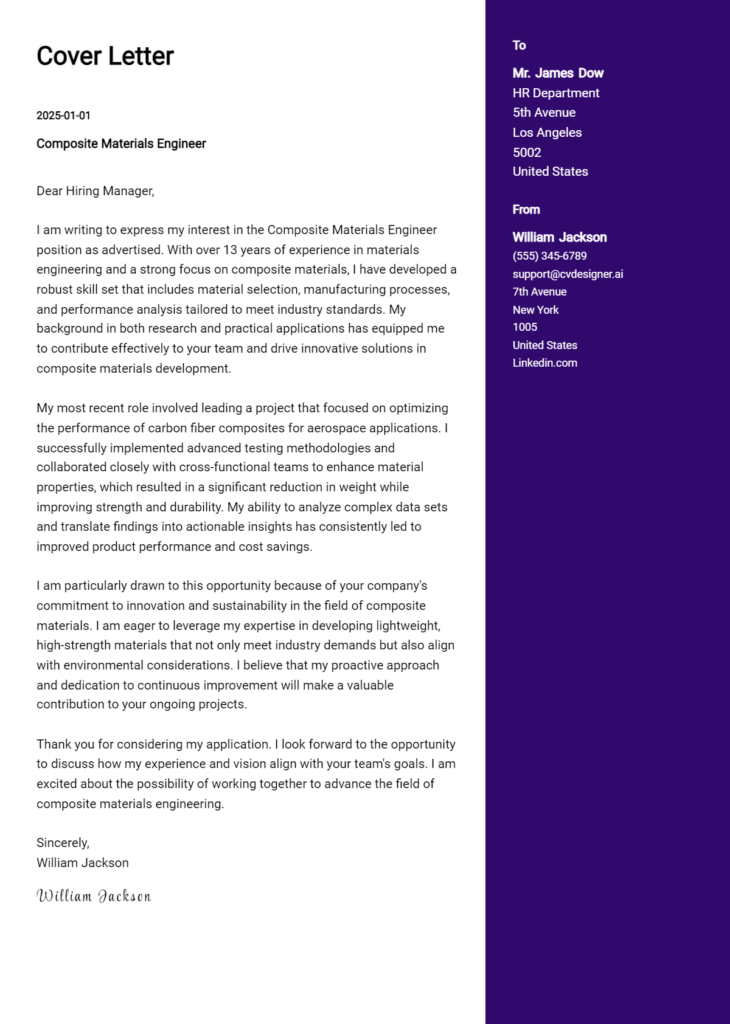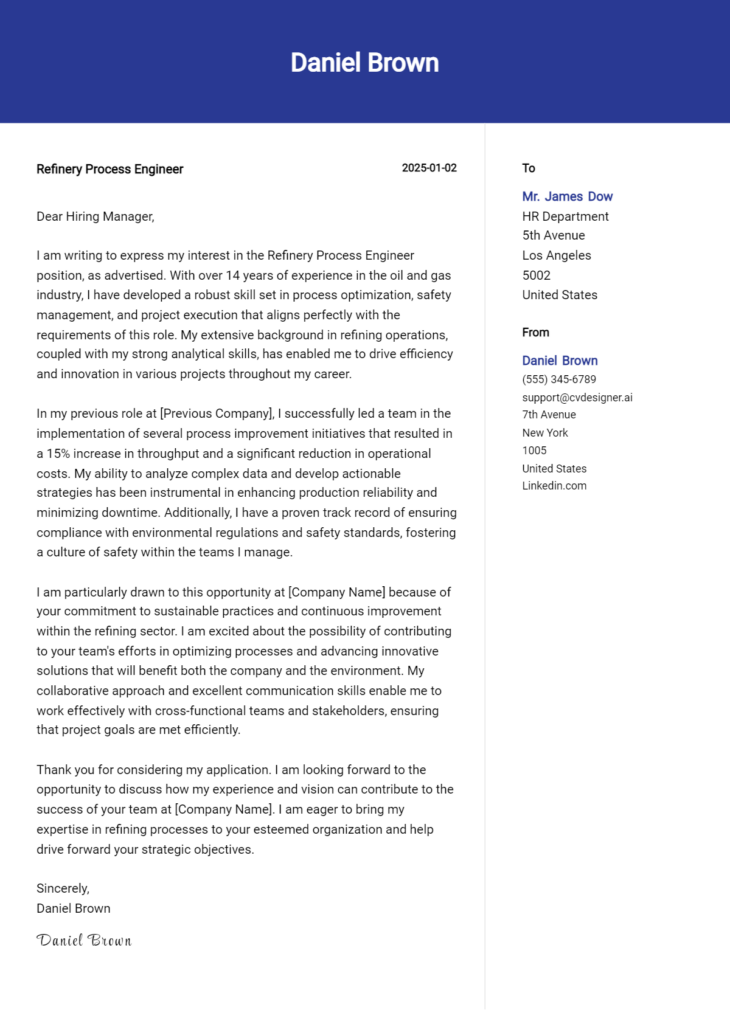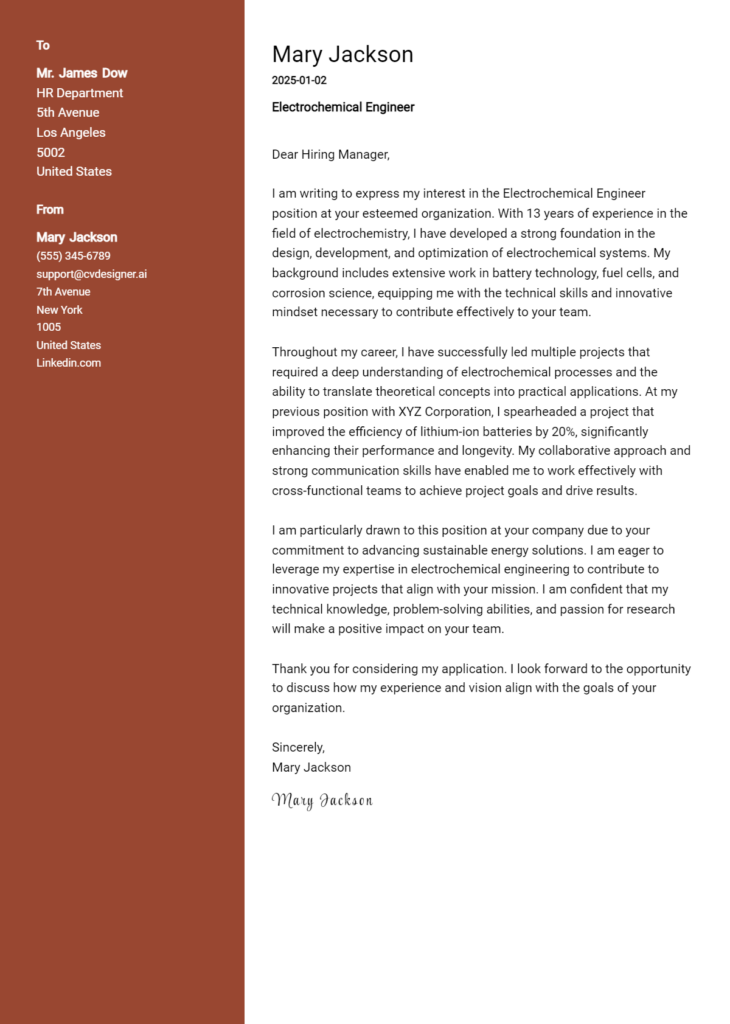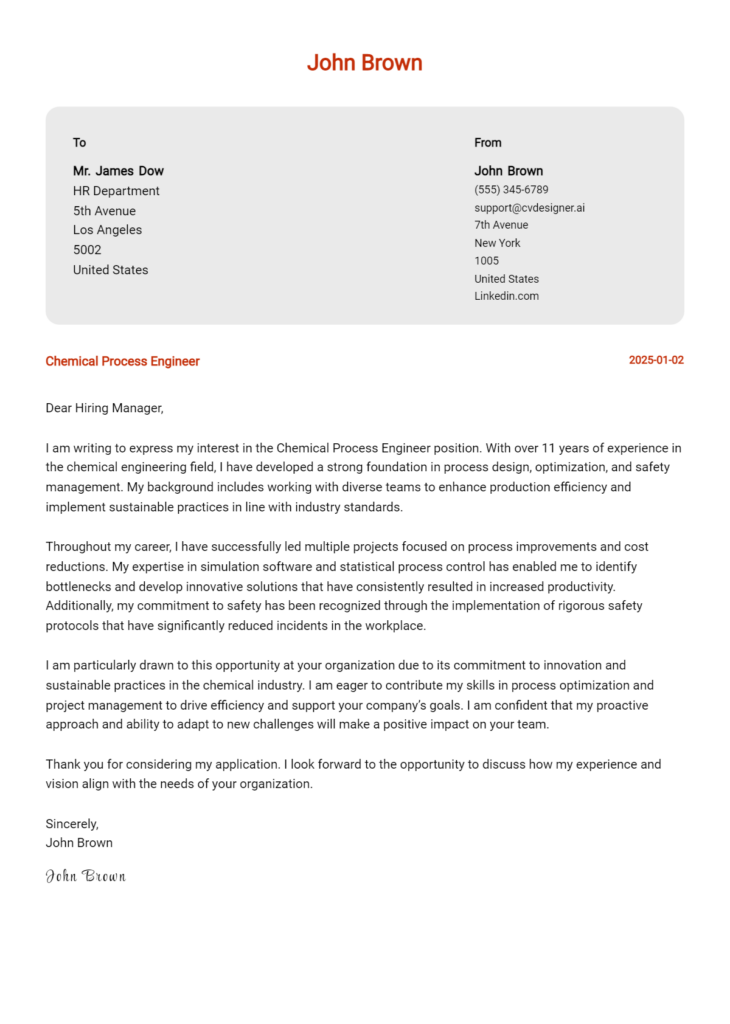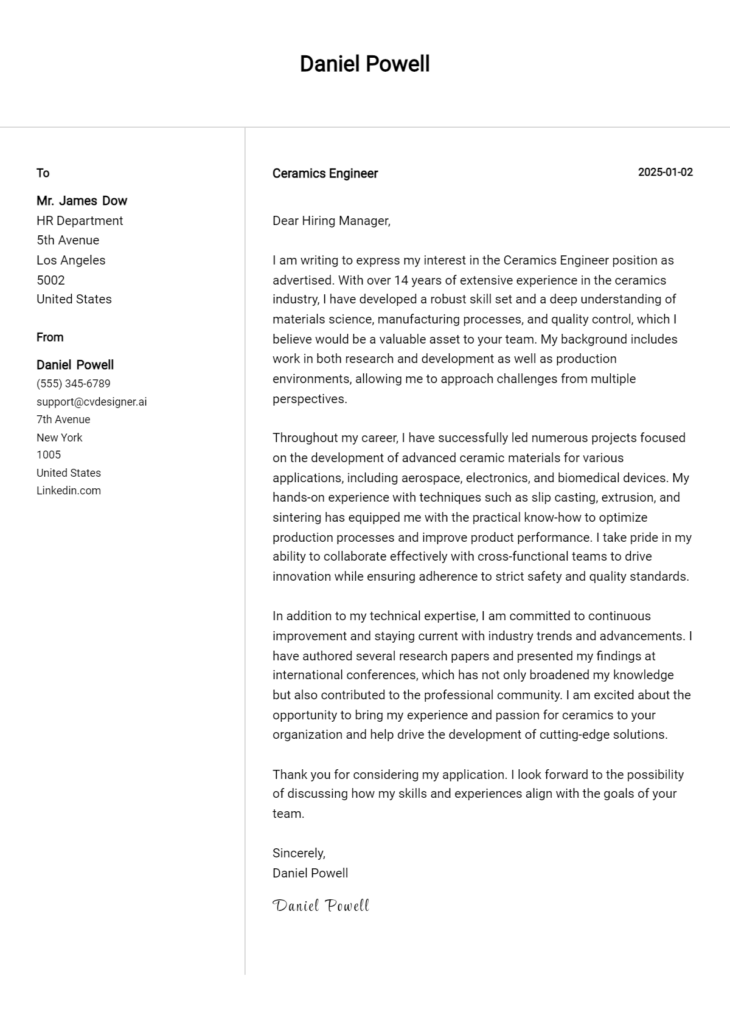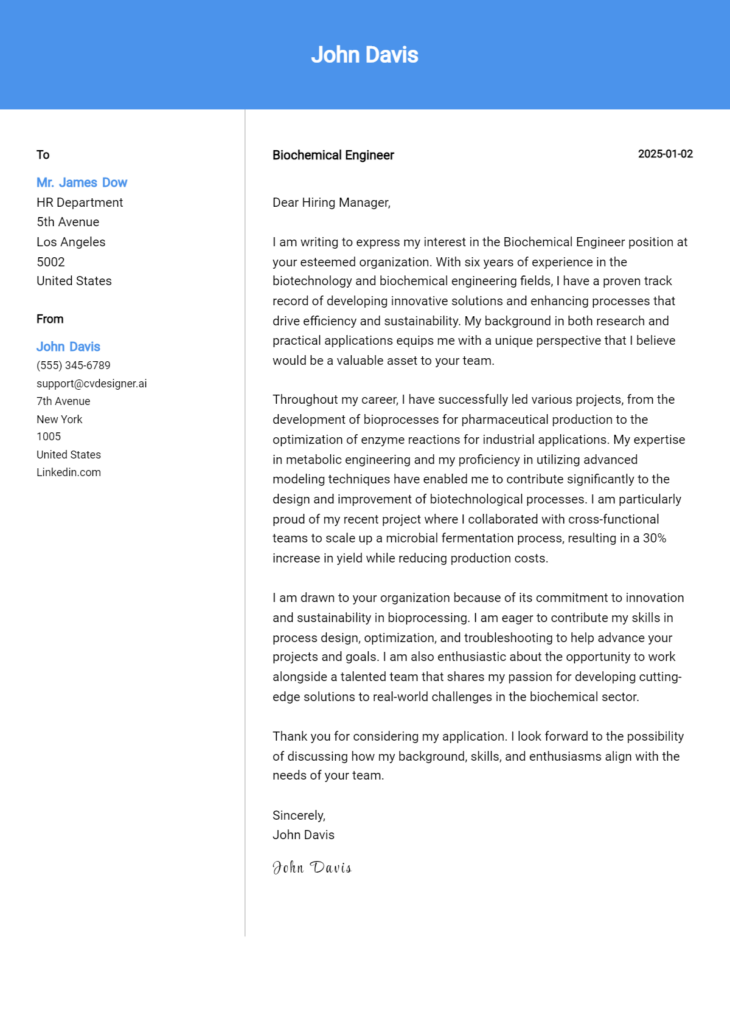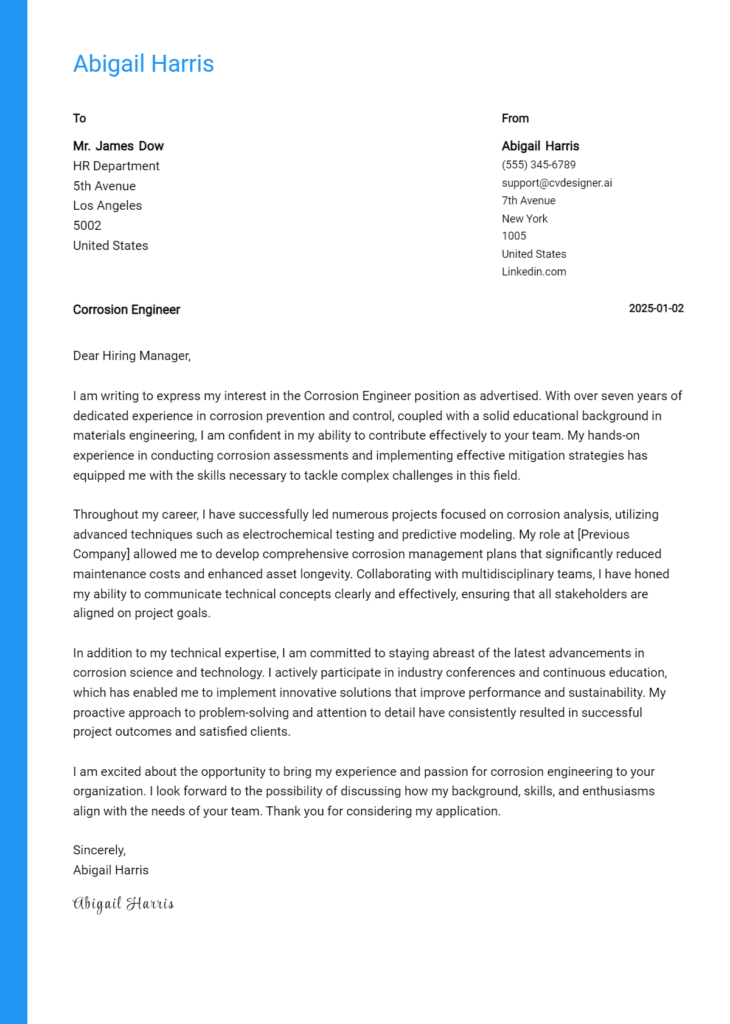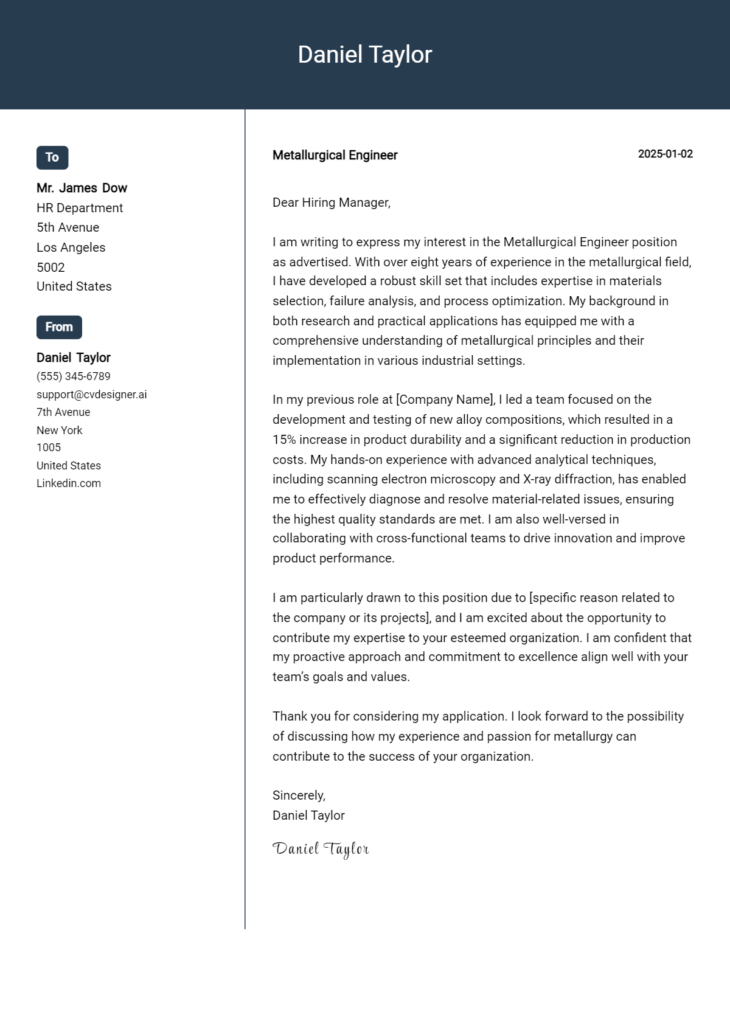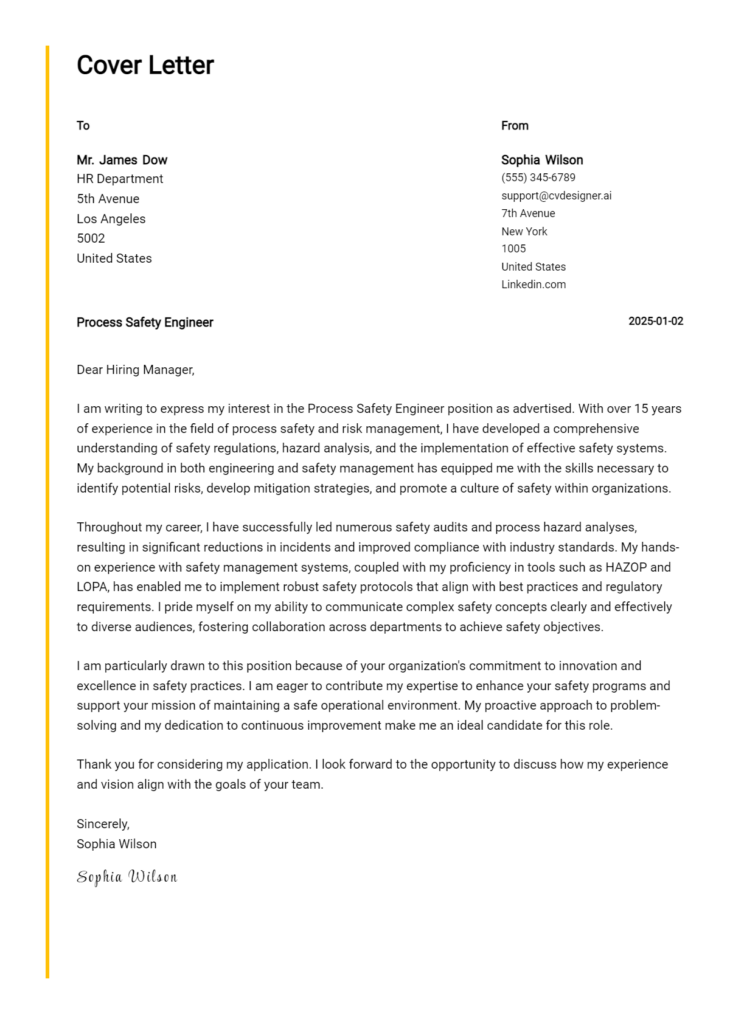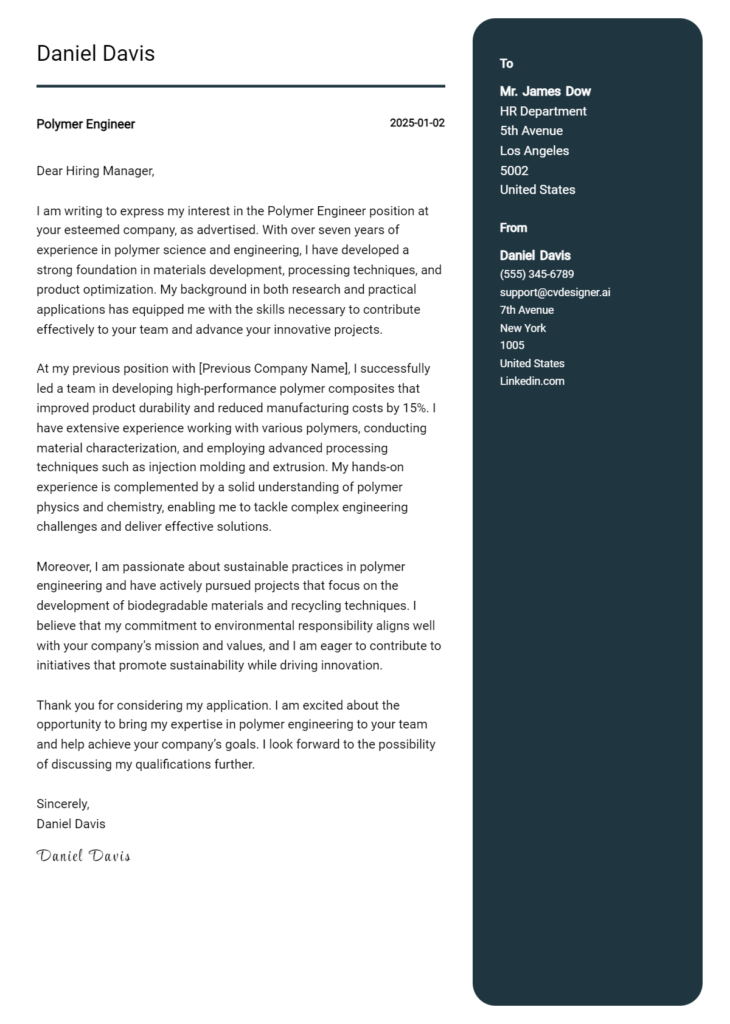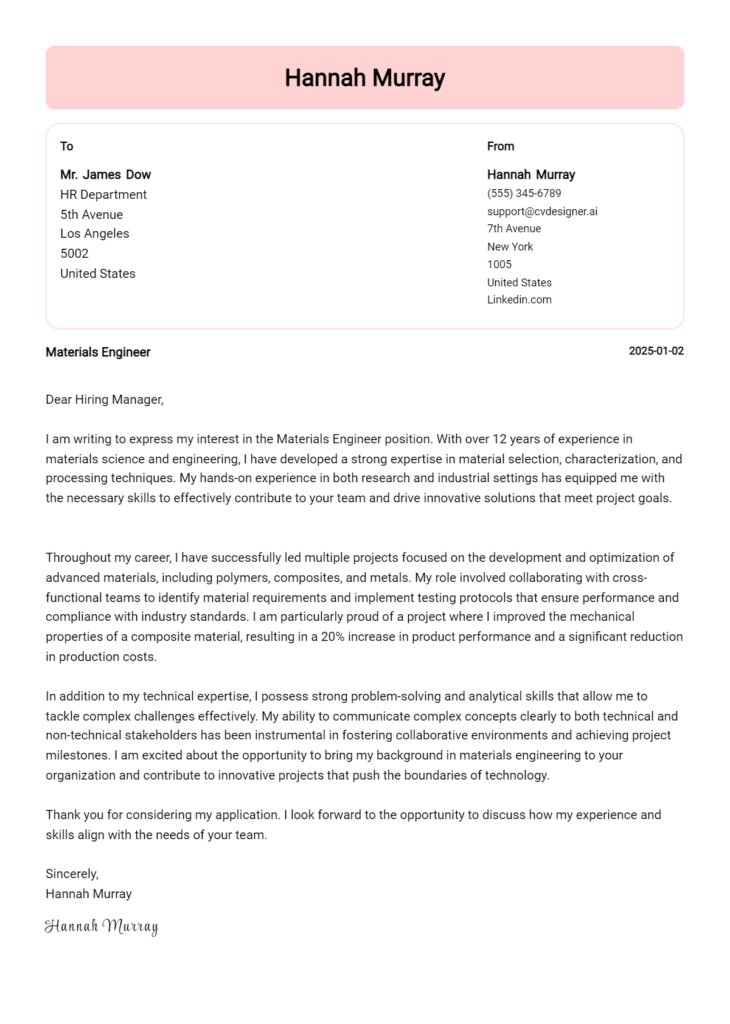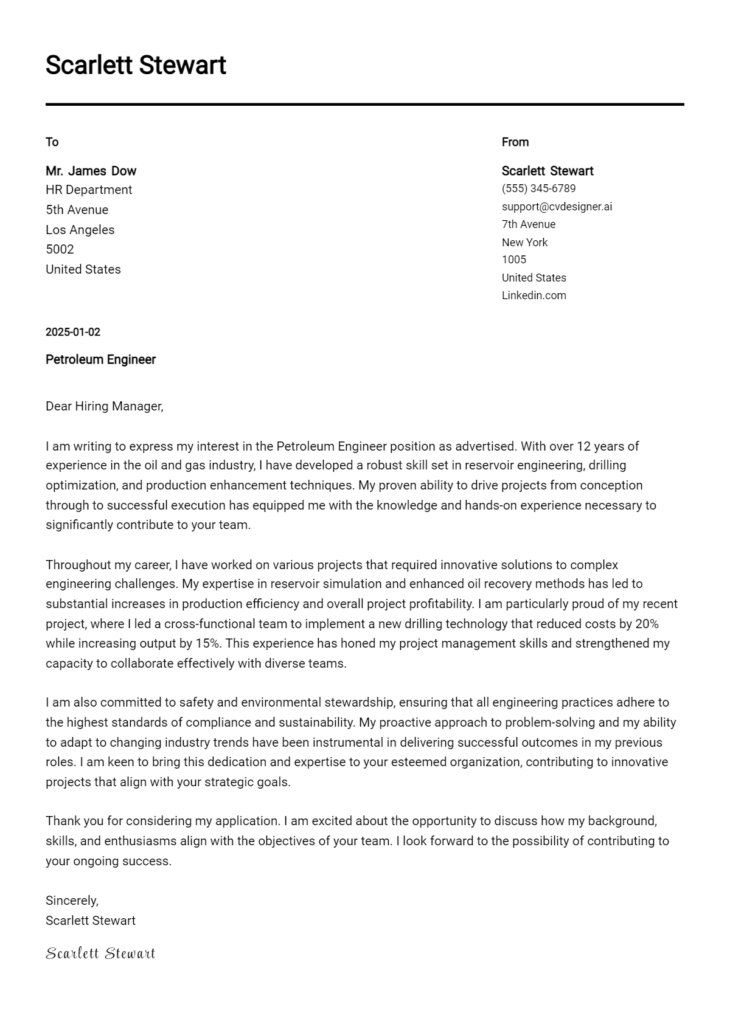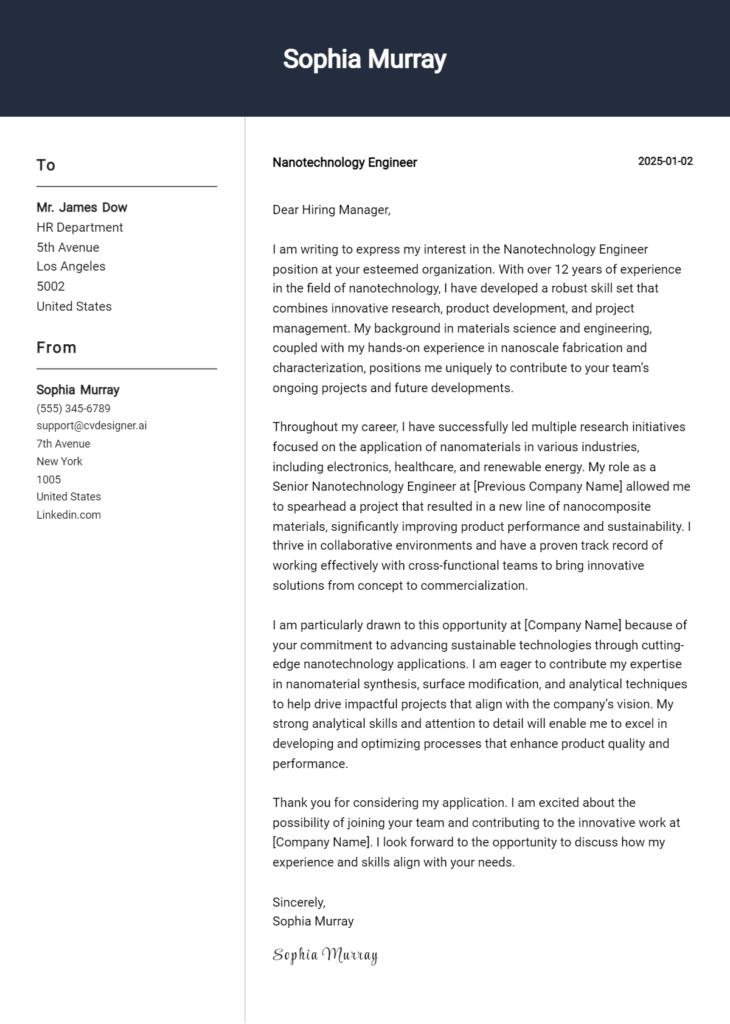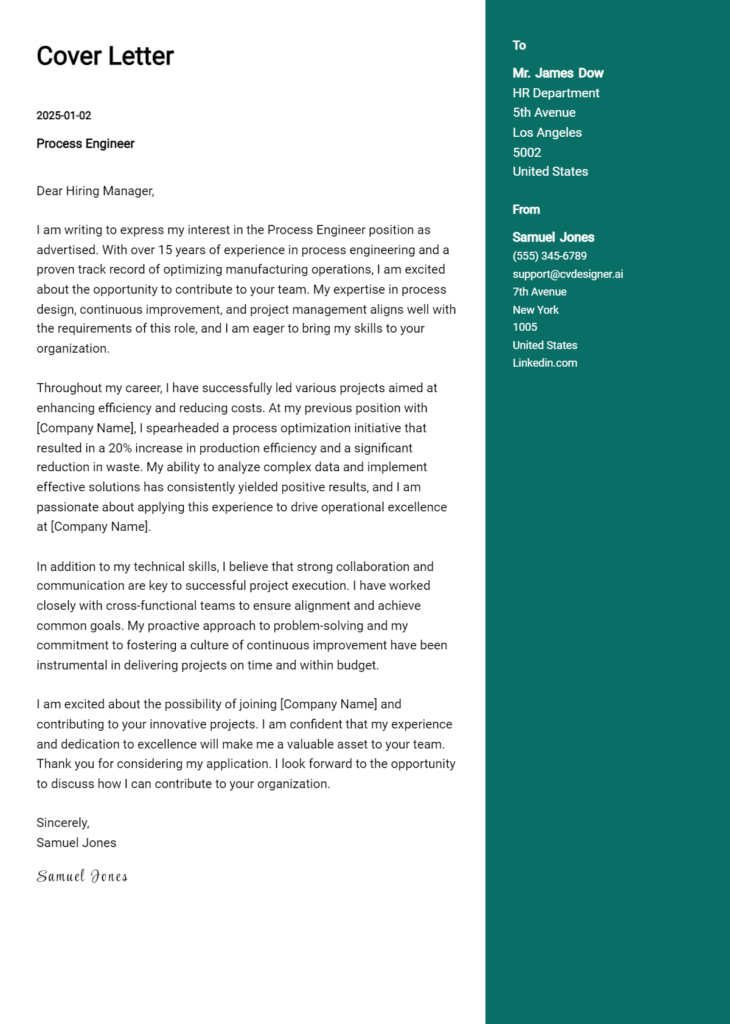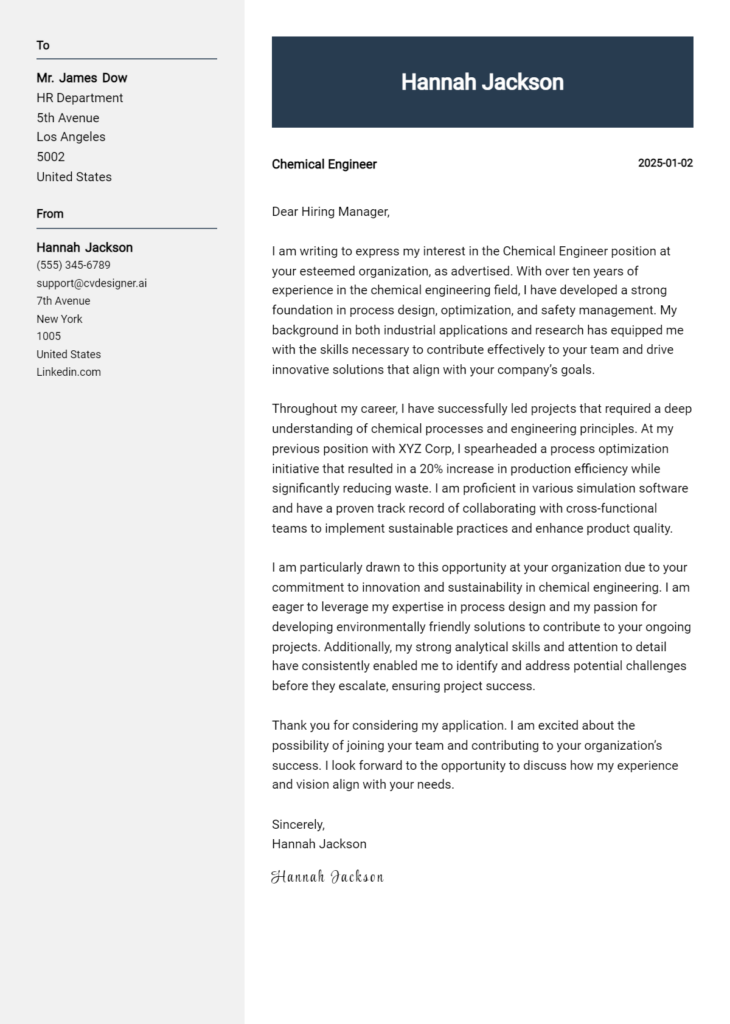Battery Engineer Cover Letter Examples
Explore additional Battery Engineer cover letter samples and guides and see what works for your level of experience or role.
How to Format a Battery Engineer Cover Letter?
Crafting a compelling cover letter is essential for a Battery Engineer, as it serves as your first opportunity to convey not only your technical expertise but also your passion for innovation in energy storage solutions. The way you format your cover letter showcases your attention to detail, critical thinking, and ability to communicate complex concepts—qualities that are vital in the field of battery technology. A well-structured cover letter can capture the hiring manager's interest and set you apart from other candidates.
In this guide, we will outline the key components of a professional cover letter, providing insights and examples tailored specifically for Battery Engineers to help you create an engaging document.
We will focus on the essential components of a cover letter, including:
- Cover Letter Header
- Cover Letter Greeting
- Cover Letter Introduction
- Cover Letter Body
- Cover Letter Closing
Each section is crucial in presenting your qualifications and professionalism effectively. Let’s delve into each part and discover how to make your Battery Engineer cover letter truly stand out.
Importance of the Cover Letter Header for a Battery Engineer
The cover letter header is a critical component of any job application, especially for a specialized role such as a Battery Engineer. It provides essential information that establishes your identity and professionalism right from the start. A well-organized header should include your contact information, the date, and the recipient's details. This clarity ensures that your application is easily identifiable and accessible to hiring managers, which can make a significant difference in a competitive job market. A professional header sets the tone for the rest of your cover letter, reflecting your attention to detail and respect for the reader's time.
Strong Example:
John Doe 123 Battery Lane Energy City, EC 12345 johndoe@email.com (123) 456-7890 October 1, 2023 Hiring Manager Battery Innovations Inc. 456 Power Drive Tech Town, TT 67890
Weak Example:
john d. battery engineer johndoe@email.com 10/1/23
The Importance of a Greeting in a Cover Letter
The greeting of your cover letter serves as the initial point of contact with the hiring manager, making it crucial for setting the tone for the entirety of your application. A well-crafted greeting not only showcases your professionalism but also adds a personal touch by directly addressing the individual responsible for reviewing your submission. This can help establish a connection and demonstrate your genuine interest in the position. To avoid sounding generic, it's important to steer clear of impersonal greetings such as "To Whom It May Concern." Instead, invest a little time in researching the recipient's name and title, which can significantly enhance the impact of your greeting.
Here are examples of strong and weak greetings for a Battery Engineer cover letter:
Strong Greeting Example
Dear Dr. Jane Smith,
Weak Greeting Example
To Whom It May Concern,
The Importance of a Compelling Cover Letter Introduction for a Battery Engineer
A well-crafted cover letter introduction is crucial for a Battery Engineer, as it serves as the first impression to the hiring manager. This introduction should not only capture attention but also convey genuine interest in the role while succinctly highlighting relevant skills or achievements. A strong introduction can set the tone for the rest of the cover letter, demonstrating the candidate's passion for battery technology and their readiness to contribute to the company's goals. Conversely, a weak introduction may fail to engage the reader and could lead to the candidate being overlooked. Below are examples to illustrate the difference.
Strong Example
Dear Hiring Manager, As a passionate Battery Engineer with over five years of experience in developing high-performance lithium-ion batteries, I am excited about the opportunity to contribute to your team at [Company Name]. My recent project at [Previous Company] resulted in a 20% increase in energy density, showcasing my ability to innovate and drive results in battery technology. I am eager to bring my expertise in materials science and electrochemistry to enhance your cutting-edge products.
Weak Example
To Whom It May Concern, I am writing to apply for the Battery Engineer position. I have some experience in the field, and I think I could be a good fit for your company. I have worked with batteries before, and I would like to work for [Company Name].
Purpose of the Cover Letter Body for a Battery Engineer
The cover letter body for a Battery Engineer serves as a critical opportunity for candidates to effectively communicate their technical expertise, relevant experiences, and the specific value they can bring to the organization. By detailing specific projects or accomplishments, candidates can illustrate their proficiency in battery technology, design, and testing. This section should highlight how their background aligns with the job requirements, showcasing their problem-solving capabilities and innovative contributions to previous teams. A well-crafted cover letter body can distinguish a candidate in a competitive job market by demonstrating not only their qualifications but also their passion for advancing battery technologies.
Strong Example
Dear Hiring Manager, I am excited to apply for the Battery Engineer position at XYZ Corporation. With a Master’s degree in Electrical Engineering and over five years of experience specializing in lithium-ion battery development, I have successfully led projects that increased energy density by 20% while reducing production costs by 15%. At ABC Technologies, I spearheaded a cross-functional team that developed a novel battery management system, resulting in a 30% improvement in cycle life. My hands-on experience with simulation software and my commitment to sustainable energy solutions make me an ideal candidate for your team. I am eager to bring my expertise in battery technologies to XYZ Corporation and contribute to your innovative projects.
Weak Example
Dear Hiring Manager, I am writing to apply for the Battery Engineer position. I have a degree in Engineering and some experience with batteries. I worked on a few projects during my time at university. I think I would be a good fit for your company because I like working with batteries. I am looking forward to the opportunity to join your team.
Importance of the Cover Letter Closing for a Battery Engineer
The closing paragraph of a cover letter is crucial, as it serves to summarize your qualifications, reiterate your enthusiasm for the position, and encourage the reader to take the next steps, such as reviewing your resume or scheduling an interview. A strong closing leaves a lasting impression and reinforces your fit for the role, while a weak one can diminish the impact of your application. Below are examples that illustrate the difference between a strong and weak closing.
Strong Example
Thank you for considering my application for the Battery Engineer position at [Company Name]. With my extensive experience in battery technology and a proven track record of optimizing energy storage systems, I am excited about the opportunity to contribute to your innovative projects. I look forward to the possibility of discussing how my background, skills, and passion align with the goals of your team. Please feel free to contact me to schedule an interview or if you require any further information.
Weak Example
I hope you liked my application. I think I might be a good fit for the Battery Engineer position. If you want to talk, you can call me. Thanks.
Crafting an effective cover letter is crucial for aspiring Battery Engineers, as it provides an opportunity to showcase not only technical skills but also problem-solving abilities and teamwork experience. A well-written cover letter can set you apart from other candidates by demonstrating your knowledge of the Software Development Life Cycle (SDLC) and your enthusiasm for continuous learning in this rapidly evolving field. Here are some tips to help you create a compelling cover letter that resonates with potential employers.
Tips for Writing a Cover Letter for a Battery Engineer
Highlight Your Technical Skills
Clearly outline your relevant technical skills such as battery chemistry, design, and testing methodologies. Use specific examples, like projects where you successfully applied these skills, to illustrate your expertise. This not only demonstrates your qualifications but also shows how you can contribute to the company's goals.Showcase Problem-Solving Abilities
Employers value engineers who can tackle complex challenges. Include a brief anecdote about a specific problem you faced in a previous role or project and the innovative solution you devised. This not only highlights your analytical thinking but also your ability to adapt and overcome obstacles.Demonstrate Knowledge of the SDLC
Mention your familiarity with the Software Development Life Cycle, especially if your work involves software integration with battery systems. Describe your experience with various phases of SDLC, emphasizing how this knowledge can enhance the development and testing of battery technologies.Emphasize Teamwork Experience
Collaboration is key in engineering projects. Detail your experience working within cross-functional teams, and highlight how you contributed to team success. Talk about the dynamics of teamwork you encountered, and how your communication skills helped in achieving project goals.Express a Passion for Continuous Learning
The field of battery technology is constantly evolving, and companies seek individuals committed to staying current. Mention any relevant certifications, workshops, or courses you have completed, and express your enthusiasm for learning new techniques or technologies that can improve battery performance and sustainability.
Incorporating these elements will help you create a powerful cover letter that effectively showcases your qualifications. For additional inspiration, explore our cover letter templates or utilize our cover letter builder to streamline your writing process.
Common Mistakes to Avoid in a Battery Engineer Cover Letter
Crafting a compelling cover letter is essential for standing out as a Battery Engineer. Avoiding common mistakes can significantly enhance your chances of making a positive impression on potential employers. Here are some pitfalls to watch out for:
Generic Greeting: Using a vague salutation like "To Whom It May Concern" can make your letter feel impersonal. Always try to address the hiring manager by name to create a stronger connection.
Repeating Your Resume: A cover letter should complement your resume, not duplicate it. Focus on specific skills and experiences that highlight your qualifications for the Battery Engineer role.
Lack of Specificity: Failing to tailor your cover letter to the job description can make you seem uninterested. Use concrete examples from your experience that directly relate to the job requirements.
Too Lengthy or Too Short: A cover letter that is either too long or too brief can lose the reader's attention. Aim for a concise format that effectively communicates your strengths—check cover letter format for guidance.
Ignoring the Company Culture: Not showing an understanding of the company’s values can be a missed opportunity. Research the company's culture and incorporate relevant points to demonstrate your alignment.
Poor Formatting: A cluttered or unprofessional layout can detract from your message. Ensure your cover letter is easy to read and visually appealing by following professional cover letter examples.
Grammatical Errors: Typos and grammatical mistakes can undermine your professionalism. Always proofread your letter or consider asking someone else to review it before submission.
By steering clear of these common mistakes, you can create a cover letter that truly showcases your qualifications and enthusiasm for the Battery Engineer position.
Cover Letter FAQs for Battery Engineer
What should I include in my cover letter as a Battery Engineer?
In your cover letter, highlight your technical expertise in battery technology, including your experience with lithium-ion, solid-state, or other battery systems. Discuss specific projects or research where you contributed to battery design, testing, or optimization. Emphasize skills like data analysis, problem-solving, and familiarity with industry standards. Additionally, mention soft skills like teamwork and communication, which are crucial in collaborative engineering environments. Tailor your letter to the job description, reflecting how your background aligns with the company's goals and projects. Finally, express your enthusiasm for the role and the organization to leave a positive impression.
How can I demonstrate my passion for battery technology in my cover letter?
To convey your passion for battery technology, start by sharing your motivation for entering the field, such as a specific experience or project that inspired you. Discuss any relevant coursework, certifications, or personal projects that showcase your commitment to advancing battery technology. You can also mention industry trends or innovations that excite you, illustrating your awareness of the field's evolution. Highlight any related extracurricular activities, such as participation in engineering clubs or competitions. By weaving personal anecdotes and industry insights into your cover letter, you can create a narrative that reflects your dedication and enthusiasm for the role.
Should I include technical jargon in my cover letter?
While it's important to demonstrate your technical knowledge, be mindful of your audience when using jargon. Ensure that the language you use is appropriate for the hiring manager or recruiter, who may not have an engineering background. Aim for clarity by balancing technical terminology with straightforward explanations. Use industry-specific terms where necessary, but avoid overwhelming the reader with excessive jargon. Instead, focus on clearly articulating your skills and experiences in battery engineering. By maintaining a professional yet accessible tone, you can effectively showcase your expertise while ensuring that your cover letter remains engaging and understandable.
How should I format my cover letter for a Battery Engineer position?
When formatting your cover letter, start with your contact information at the top, followed by the date and the employer's details. Use a professional font like Arial or Times New Roman, and keep the font size between 10 and 12 points. Aim for a clean, single-column layout with standard margins. Begin with a strong opening paragraph that captures attention, followed by body paragraphs detailing your qualifications and experiences. Use concise paragraphs and bullet points to enhance readability. Conclude with a closing paragraph that reiterates your interest and invites further discussion. Finally, include a professional sign-off, such as "Sincerely," followed by your name.
Build your Cover Letter in minutes
Use an AI-powered cover letter builder and have your letter done in 5 minutes. Just select your template and our software will guide you through the process.

